英语翻译霸气外露版反译法(negation)
Negation(反译法)
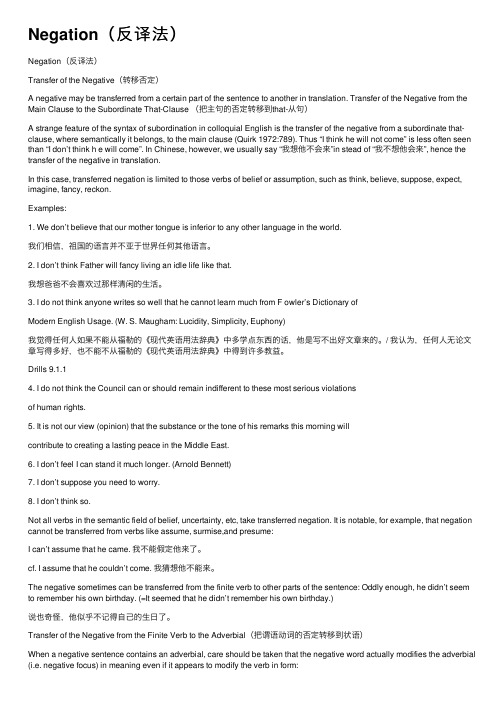
Negation(反译法)Negation(反译法)Transfer of the Negative(转移否定)A negative may be transferred from a certain part of the sentence to another in translation. Transfer of the Negative from the Main Clause to the Subordinate That-Clause (把主句的否定转移到that-从句)A strange feature of the syntax of subordination in colloquial English is the transfer of the negative from a subordinate that-clause, where semantically it belongs, to the main clause (Quirk 1972:789). Thus “I think he will not come” is less often seen than “I don’t think h e will come”. In Chinese, however, we usually say “我想他不会来”in stead of “我不想他会来”, hence the transfer of the negative in translation.In this case, transferred negation is limited to those verbs of belief or assumption, such as think, believe, suppose, expect, imagine, fancy, reckon.Examples:1. We don’t believe that our mother tongue is inferior to any other language in the world.我们相信,祖国的语⾔并不亚于世界任何其他语⾔。
翻译常用的八种技巧
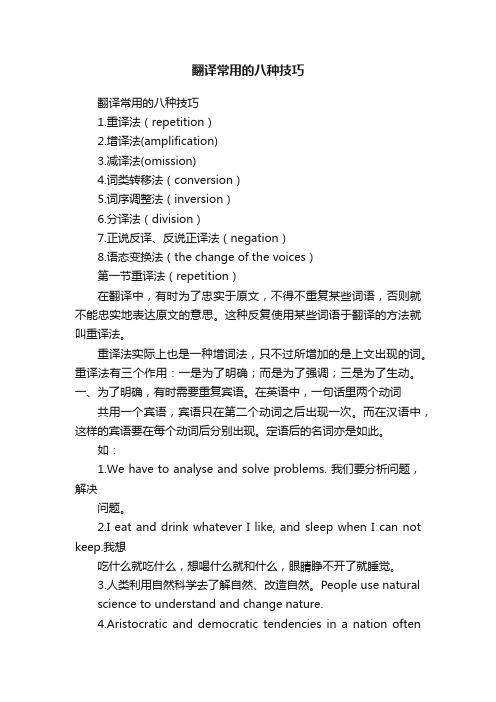
翻译常用的八种技巧翻译常用的八种技巧1.重译法(repetition)2.增译法(amplification)3.减译法(omission)4.词类转移法(conversion)5.词序调整法(inversion)6.分译法(division)7.正说反译、反说正译法(negation)8.语态变换法(the change of the voices)第一节重译法(repetition)在翻译中,有时为了忠实于原文,不得不重复某些词语,否则就不能忠实地表达原文的意思。
这种反复使用某些词语于翻译的方法就叫重译法。
重译法实际上也是一种增词法,只不过所增加的是上文出现的词。
重译法有三个作用:一是为了明确;而是为了强调;三是为了生动。
一、为了明确,有时需要重复宾语。
在英语中,一句话里两个动词共用一个宾语,宾语只在第二个动词之后出现一次。
而在汉语中,这样的宾语要在每个动词后分别出现。
定语后的名词亦是如此。
如:1.We have to analyse and solve problems. 我们要分析问题,解决问题。
2.I eat and drink whatever I like, and sleep when I can not keep.我想吃什么就吃什么,想喝什么就和什么,眼睛睁不开了就睡觉。
3.人类利用自然科学去了解自然、改造自然。
People use naturalscience to understand and change nature.4.Aristocratic and democratic tendencies in a nation oftenshowthemselves in its speech.民族的贵族倾向和民族倾向常在其言语中表现出来。
5.我们来修改安全规则和卫生规则吧。
Let’s revise our safety andsanitary regulations.二、英语常用省略,但为了明确,也为了强调某些内容,在汉语中常常要将省去的部分重译出来。
定义Negation作为一种翻译技巧它主要是指在翻译实践
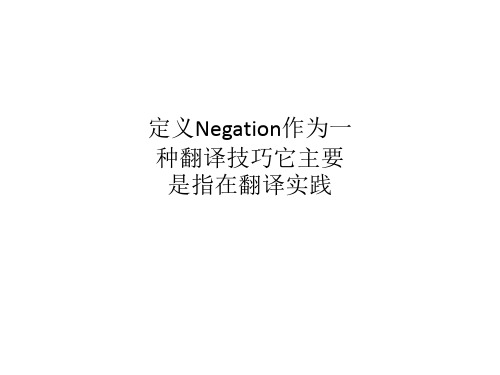
If it worked once,it can work twice.(sentence) 一次得手,再次不愁。
2.Negative in English,but Affirmative in Chinese. 英语为否定,汉语译作肯定
6.Some Traps in Negative Structures 否定的陷阱
e.g.
(1)not…becase
The engine didn’t stop becase the fuel was finished. 引擎并不是因为燃料耗尽而停止运转。
Gates didn’t drop out becase he wanted to avoid work but to start his company.
1.Affirmative in English,but Negative in Chinese 英语为肯定,汉语译作否定
e.g. He denied it to be the case.(v.) 他说事实不是这样。
It was beyond his power to sign such a contract. (prep.) 他无权签订这种合同。
• 4)这家机构因公正在国际上享有声誉。 • The agency enjoys an international
reputation for impartiality.(名词)
• 5)她光着脚走进了房间。 • She came into the room with no
shoes on.(介词短语)
5.Roundabout Affirmative
英语翻译技巧之反译法(negation)

• Not… and … VS Not… or…
E.g. He did not speak clearly and correctly. He did not speak clearly or correctly.
他讲得清楚,但不正确。
他讲得不清楚,也不正确。
(2). Full negation (全部否定)
big audience. • 昨天总统在大庭广众面前即席致辞。 • Aren’t they fine, these three men are going off into nowhere
like that? • 这三人真行,前途茫茫,就这样去了。
(2). Conversion of Negative Sentences into Affirmatives • My overcoat would not wear out. • 我的大衣十分耐穿。 • If that isn’t what I want! • 我所要的就是这个呀! • Nothing is more deceitful than the appearance of humility. • 谦卑的外表是最易使人上当的。
翻译技巧之反译法 Negation
1. Transfer of the Negative (否定转移)
(1). 把主句的否定转移到that从句
• think, believe, suppose, expect, imagine, fancy, reckon 引导的从 句,在英翻中时应使用否定转移 E.g. We don’t believe that our mother tongue is inferior to any other
Negative (肯定形式译成否英语句子中既没有否定词,如no, not, never, none, neither, nobody, nothing, nowhere , nowise, 也没有带有否 定前缀或后缀的词,如dis-, im-, in-, ir-, non-, un-, -less.
Negation(正说反译、反说正译)
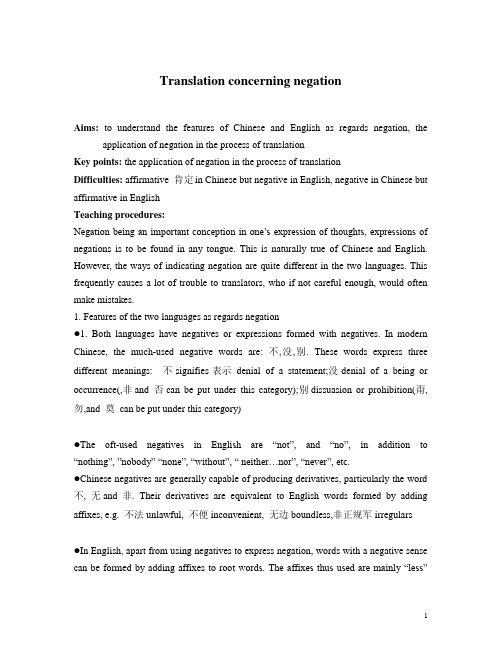
Translation concerning negationAims: to understand the features of Chinese and English as regards negation, the application of negation in the process of translationKey points: the application of negation in the process of translationDifficulties: affirmative 肯定in Chinese but negative in English, negative in Chinese but affirmative in EnglishTeaching procedures:Negation being an important conception in one’s expression of thoughts, expressions of negations is to be found in any tongue. This is naturally true of Chinese and English. However, the ways of indicating negation are quite different in the two languages. This frequently causes a lot of trouble to translators, who if not careful enough, would often make mistakes.1. Features of the two languages as regards negation●1. Both languages have negatives or expressions formed with negatives. In modern Chinese, the much-used negative words are: 不,没,别. These words express three different meanings: 不signifies表示denial of a statement;没denial of a being or occurrence(,非and 否can be put under this category);别dissuasion or prohibition(甭,勿,and 莫can be put under this category)●The oft-used negatives in English are “not”, and “no”, in addition to “nothing”, ”nobody” “none”, “without”, “ neither…nor”, “never”, etc.●Chinese negatives are generally capable of producing derivatives, particularly the word 不, 无and 非. Their derivatives are equivalent to English words formed by adding affixes, e.g. 不法unlawful, 不便inconvenient, 无边boundless,非正规军irregulars●In English, apart from using negatives to express negation, words with a negative sense can be formed by adding affixes to roo t words. The affixes thus used are mainly “less”suffix “un” “in”, and “non”●However, English words formed with affixes with a negative, while adjective and nouns formed with “un” such as “unavoidable” and “unbelief” are negative, for instance, verbs forme d with affixes such as “unclasp” and “uncork” affirmative.●In Chinese, words formed with negatives are generally negative in sense but in some cases they assume new meaning like 非常, which practically means 很.●In English, the same word formed with a different affix differs in meaning (compare discord with uncord). Sometimes, words formed with different affixes 词缀with a negative sense would produce words with different implications含义---derogatory贬义and the other non-derogatory褒义. For instance, immoral means 不道德,and is therefore derogatory while unmoral means 非道德,无道德观念的,and is therefore non derogatory. 1.W arm-up exercises2.I don't’ think Tom is correct.3.I don’t think Xiaoming is coming tomorrow.4.A re you not going tomorrow?---- No, I am not going .5.A frica is not kicking out W estern imperialism in order to invite other new masters.6.T he world today is far from peaceful.7.O ur PLA is worthy of being called a great army of the people.8.H e tried his best to overcome the lack of technical data.9.T he window refused to open.10.Y esterday he failed to get to school on time.11.They excluded children from getting in.12.The building is in a state of neglect.13.He is often absent- minded.14.To do this is beyond me.15.Lei Feng’s noble deeds are above all praise.16.I, rather than you , should do the work.17.The truth is quite other than what you think.18.She refrained from laughing.19.She was refused admitance by them.20.An opportunity is not likely to repeat itself.21.Live up to the expectations of our own people and the people throughout the world.22.Slips are scarely avoidable when you are new to your work.23.The meetings were marked by such an absence of lively discussions that at times they were almost on the piont of breaking up.24.Avoid operating the keys roughly.25.The scientists made a solemn plege at the conference, saying, “W e’ll forever live up to what our Party expecs of us.”26.The evidence is conclusive, excluding all possibilities of doubt.27.That fellow is far from being honest.28.Luan Ping stood still, trying vainly (in vain) to answer the battery of questions Y ang Zirong raised.29.That served to strenghen instead of weaken our determination.30.But for their help. W e should not succeeded in this experiment.31.All that glitters is not gold.32.All is not lost.33.All criminals are murderers.34.But aal men are born to reign.35.All that flatter you too much are not faithful friends.36.Both children are not clever.37.W e never thought of nothing wrong.我们从来没有想到有什么错误。
Negation 句意反译

3.名词 absence ,failure , lack ,ignorance ,-ness等等 • He was extremely sorry for the shortness of time. 他对时间不足感到十分抱歉。 • Behave yourself during my absence. 我不在时要规矩点。
• The islanders found themselves far from ready
to fight the war. (短语)
岛民发现自己远远没有做好作战准备。 • We believe that the younger generation will prove worthy of our trust. (短语) 我们相信,年轻一代将不会辜负我们的信任。 • 这份说明书不够详尽。 This specification lacks detail.
每一种语言都有自己独特的否定方式。 由于英、汉语之间存在着很大差别, 在翻 译时可以根据英、汉语各自的特点及其表 达习惯等,进行正反互译, 即英语从正面 表达, 汉语可以从反面翻译;英语从反面 表达, 汉语可以从正面翻译, 从而使译文 符合译语的表达习惯、达到强调或修辞的 目的或准确地表达出原文的精神风貌。运 用正反译法时,我们要注意语体的变化。一 般说来,正说显得较正规,反说较口语化。
ห้องสมุดไป่ตู้
这种正说和反说的相互转换是翻译技 巧中的一个重要方法。它属于引申和修辞 范围。那么,什么是正说和反说呢?英语 词句中含有“never”,“no”,“not”,、 “un-”,“in-”,“-less”等成分以及汉语 词句中含有“不”、“没”、“无”、 “未”、“甭”、“别”、“非”、“勿” 等成分的为反说,不含有这些成分的为正 说。
汉译英unit7反译
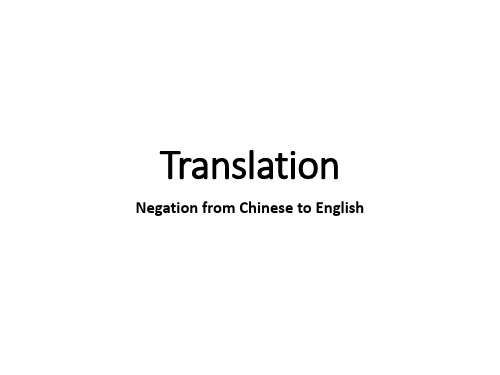
e.g. 1.乔纳森可以说是一个办事效率高,思维敏捷并很有 敬业精神的一个职员。
Jonathan is an efficient, swift and dedicated employee. 属类:【应用文体 】-〖求职英语〗-[简历英语] 2.这位著名作家虽已九十二岁高龄,但仍然思维敏捷。
The famous writer is still sharp in thought though he has attained the age of ninety-two.
中国翻译网
返回
英语中带有否定意义的词汇和词组
• Lack, fail, deny, miss, exclude, run short/ out of, keep/stop/refrain/prevent (from), (get) rid of, want, overlook, … • Absence, exclusion, failure, ignorance, denial • Absent, missing, ignorant, gone, free/far/safe from, short of, exclusive of, … • Beyond, without, above, except, save, but, in vain, before, unless, (other) than, or, rather than, would rather than, know better than, …
返回
靠不靠得住?Байду номын сангаас的十二大说靠得住,我也相信是靠得住 的,
Can it be done? The Twelfth National Congress of the Party says it can. And I also believe it can. 属类:【时事政治 】-〖邓小平选集〗-[十年准备] 我们现在执行的这条路线是党的十一届三中全会制定的, 也是经过党的十二大肯定的。 The line we are following was formulated at the Third Plenary Session of the Eleventh Central Committee of the CPC and affirmed at the Twelfth National Party Congress. 属类:【时事政治 】-〖邓小平选集〗-[两个文明建设]
正说反译

up
CONTENT
② Negation ③ What
is a positive sentence ?
④正说反译的目的
⑤英译汉正说反译法
⑥汉译英正说反译法
Warming up
(1) Wet paint! Keep upright! 油漆未干! 切勿倒置! (2) I wrote three books in the first two years, a record never reached before. 我头两年写了三本书,打破了以往的记录。 原文从反面表达,译文从正面表达。如译成“这是 他从前从未达到的记录”则显得很别扭。 (3) I have read your articles, but I expect to meet an older man. 我读过你的文章,但没料到你这样年轻。 本句如译成“我读过你文章,但我料想会见到一个 年纪更大的人”则不符合汉语表达习惯。
Negation
Negation 是一种翻译技巧。从翻译角 度来看,Negation是指在翻译实践中, 为了使译文忠实而又符合语言习惯的 表达原文的思想,有时必须把原文中 的肯定说法变成译文中的否定说法, 或是把原文中的否定说法变成译文中 肯定说法,因此,翻译技巧中将其译 成“正说反译,反说正译”更为合适。 从语法角度来说,Negation译成“否 定”,它大致可以分为以下几类:
副词
A: The boy is quite clever . B: Exactly.甲:这孩子很聪明。乙:一点也不错。
Examples
前置词
1)This problem is above me . 这个问题我解决不了。 (或,这个问题我不懂。) 2)It was beyond his power to sign such a contract.他无权签订这种合 同。
正反译法-negation(课件)

• 不是两种物质都溶于水。
4. 形式否定
否定词与其他词连用形成一种固定结构,其形式上是 否定的,但语义上表示对事物的否定达到极端程度, 接近于否定的否定,实际上是肯定的意思。常见的 有”nothing like(没有什么比得上…), cannot…too(越……越好,再...也不过分)”,。 “cannot…too”的结构可以有变体,如 cannot可 改为 be impossible, not可用 scarcely, hardly, never等代替。
along with the scheme.
• 她可能是最不同意这项计划的人。 • 2)That’s the last thing I’d expect
you to do.
• 那是我最不愿意你去做的事情。
• 7. 表示否定的特殊表达结构 • More than • 1)The beauty of this city is more
创造,也没有能量能被消灭。
• (正)能量转换的实验说明能量既不能
创造,也不能消灭。
3. 部分否定
• 部分否定主要由all, every, both, always等含
全体意义的词与否定词构成,这类否定句中的否 定词not有时与谓语在一起,构成谓语否定。形 式上很像全部否定,但实际上是部分否定。在这 种部分否定句中,因词序与汉语很不相同,汉译 时稍一不慎就会造成差错,这类句子中不论 not 在什么地方,通常都译为“不全是”、“不总 是”、“并非都”、“未必都”等。
• 再困难的任务,我们也能完成。
• 6. 含蓄否定
• 英语里有些词或词组形式上是肯定的,但意义往往 是否定的,由这类词或词组表达的否定称为含蓄否 定或意义否定。汉译时,一定要把否定的意义明确 译出。
反译法

4. He’s missed school three days this week.
他这星期有三天没有去上学。
5. I was denied the chance of going to university.
我当时没有上大学的机会。
正说反译法(形容词) He is ignorant of English. 他不懂英语。
也就是说,人们在叙述同一事物或
表达同一思想时,可以正说,也可 以反说。汉语如此,英语也如此。 我们不否认我们工作中有缺点。 我们承认我们工作中有缺点。 We admit that we have some shortcomings in our work. We do not deny that we have some shortcomings in our work.
老师发现有些学生不在。
The decision is not final. 这个决定不是不可改变的。 She said angrily,“The men are all bad!” 她愤愤地说,男人都不是好东西! The company’s failure was due to bad management. 公司因经营不善破产。 His key was lost.
1. The certificate is invalid, if not under the steel seal.
本证书加盖钢印方能生效。
2. They didn’t stop talking until they fell asleep.
他们一直谈到入睡。
3. I shall not fail to help you when necessary.
你知道她为什么老是不想见到你吗?
英译汉第十一课

the speakers, nor short enough for the hearers.
during my absence. • 我坚决反对我不在的时候作出的决定。 • 3)These two lines are not clear. Let's just give
them a miss.
• 这两行不清楚,咱们跳过去不看吧。
短语
• 1) The islanders found themselves far from ready to fight the war.
• 否定一部分意义,而不是全部意义。 • All that glitters is not gold. • 闪光的并不一定都是金子。 • All criminals are not murderers. • 罪犯并非都是杀人犯。 • Every man cannot be a poet. • 并非人人都能成为诗人。 • Great man are not always wise. • 伟人并非总是聪明的。
赶快把信寄出去 4)The examination left no doubt that the patient had
died of cancer. 调查结果清清楚楚地说明病人死于癌症。
• 5) He was an indecisive sort of person and always capricious.
实用英语翻译6 Negation
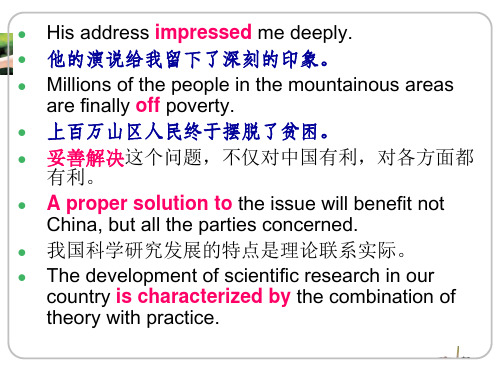
介词
I do think that it is beyond his power to fulfill the task. 我的确认为要完成这项任务是他力所不及的。 I have fallen behind with my correspondence. 我有一些信件没有及时答复。
形容词 agreeable sweetness 甜而不腻 the unbounded universe 浩瀚的宇宙 The plan is final. 那个计划没得商量。 He would be the last man to say such things. 他绝不可能说这种话。 Now, Clara, be firm with the boy. 听我说,克拉拉,对这孩子可不能心软。
一、英译汉正说反译法---动词 refuse(不愿;不肯;无法),lack(缺乏;没 有),defy(不服从;不遵守;不让),forbid(不 许),stop(不准)和ignore(不理;不肯考虑) The window refuses to open. 窗户打不开。 Such a chance denied me. 我没有得到这个机会。 The plan leaves much to be desired. 这个方案大有不足之处。
cannot see an inch beyond one’s nose
鼠目寸光
四、双否定译肯定
There can be no sunshine without shadow. 译文:有阳光就有阴影。 It’s not seldom that he plays poker. (= He often plays poker. ) 译文:他常常打扑克。 We must never stop taking an optimistic view of life. 译文:我们对生活要永远抱乐观态度。 There is no story without coincidence. 无巧不成书。
negation

正说反译或反说正译的相互转换, 其目的主要有三个: 1. 明确语义。 2. 加强修辞。 3. 符 合目的语习惯。
注意:英语正面表达是指在原文中没有用no、not或 带否定意义前缀的词,如: dishonest, impossible, indirect 。 英语中有些词或短语常常正说反译,如: miss the bus( 没有赶上公共汽车 ) , live up to the Party's expectations( 不辜负党的期望 ) , be absent from the meeting( 没有出席会议 ) , a final decision( 不可改变的决定 ) , (be) at a loss ( 不知 所措 ) 等。 英语中有时原词所表达的并不是其字面意义, 而是其字面意义的反义,或者说是对其字面意义的 否定。例如: gas mask( 防毒面具 ) , riot police( 防暴警察 ) , crisis law( 反危机法案 )
他仍然没有弄懂我的意思。 正译: He still could not understand me. 反译: Still he failed to understand me. 无论如何,她算不上一位思维敏捷的学生。 正译: She can hardly be rated as a bright student. 反译: She is anything but a bright student. Please withhold the document for the time being. 正译: 请暂时扣下这份文件。 反译: 请暂时不要发这份文件。
Such mistakes couldn‘t long escape notice. 这类错误迟早会被发觉的. (三)有些否定表达在译成汉语时,为了符合目的语的语言习惯,则 需使用正译法. The examination left no doubt that the patient died of cancer. 检验结果清楚地表明病人死于癌症. Even so, I still insist that for the individual himself nothing is more important than this personal, interior sense of right and wrong. 即便如此,我仍坚持认为,对个人而言,最重要的莫过于这种根植于 个人心灵深处的是非感,以及坚决按这种是非感行事的决心. Hitler's undisguised effort to persecute the Jews met with world-wide condemnation. 希特勒对犹太人的露骨迫害行为受到全世界的谴责. Mr. Rumsfeld said the Soviet Union was unprecedentedly engaged in a missle-building program. 拉姆斯菲尔德说,苏联正以空前的规模推行制造导弹的计划.
英语翻译技巧之反译法(negation)

The reverse translation method is not applicable to the translation of all negative expressions. For some negative expressions with specific cultural backgrounds or emotional colors, other translation techniques or methods may need to be used for translation.
The Negation Method of English Translation Techniq
Introduction to Reverse Translation Method The Application of Reverse Translation Method in English Translation Practice and Case Analysis of Reverse Translation Method Practice and improvement of reverse translation method Summary and Reflection
Reverse translation of negative intentions
Summary: There are some special negation structures in English, such as pre negation, post negation, etc. Reverse translation is a common technique for dealing with these structures.
正反译法Negation
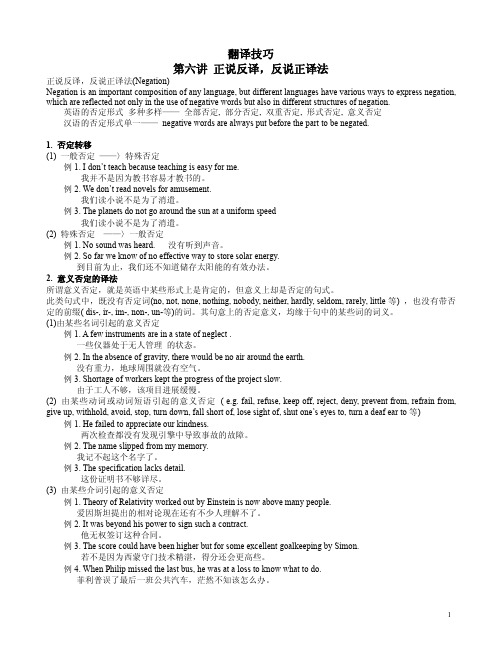
翻译技巧第六讲正说反译,反说正译法正说反译,反说正译法(Negation)Negation is an important composition of any language,but different languages have various ways to express negation, which are reflected not only in the use of negative words but also in different structures of negation.英语的否定形式多种多样——全部否定,部分否定,双重否定,形式否定,意义否定汉语的否定形式单一——negative words are always put before the part to be negated.1.否定转移(1)一般否定——〉特殊否定例1.I don’t teach because teaching is easy for me.我并不是因为教书容易才教书的。
例2.We don’t read novels for amusement.我们读小说不是为了消遣。
例3.The planets do not go around the sun at a uniform speed我们读小说不是为了消遣。
(2)特殊否定——〉一般否定例1.No sound was heard.没有听到声音。
例2.So far we know of no effective way to store solar energy.到目前为止,我们还不知道储存太阳能的有效办法。
2.意义否定的译法所谓意义否定,就是英语中某些形式上是肯定的,但意义上却是否定的句式。
此类句式中,既没有否定词(no,not,none,nothing,nobody,neither,hardly,seldom,rarely,little等),也没有带否定的前缀(dis-,ir-,im-,non-,un-等)的词。
连淑能《英译汉教程》Negation(反译法)【圣才出品】

第9章Negation(反译法)9.1 复习笔记In translation, negation means the formal conversion from the affirmative into the negative or vice versa, which is one of the techniques.反译法是将肯定句译成否定句,或将否定句译成肯定句的一种形式转化。
一、Transfer of the Negative(转移否定)1. Transfer of the Negative from the Main Clause to the Subordinate That-Clause(把主句的否定转移到that-从句)It is the transfer of the negative from a subordinate that-clause, where semantically it belongs, to the main clause (Quirk, 1972:789). In this case, transferred negation is limited to those verbs of belief or assumption, such as think, believe, suppose, expect, imagine, fancy, reckon.在英语语法中,当主句的谓语动词是think,believe,suppose,expect,imagine,fancy,reckon等表示主观意见的词时,往往将从句的否定转移到主句,即语意上是对从句的否定,但在句法上要对主句进行否定。
因此,在翻译时,要把主句的否定转移到that-从句。
2. Transfer of the Negative from the Finite Verb to the Adverbial(把谓语动词的否定转移到状语)When a negative sentence contains an adverbial, care should be taken that the negative word actually modifies the adverbial in meaning even if it appears to modify the verb in form.如果一个否定句包含副词,要注意,虽然句中的否定词在形式上修饰动词,但在语意上修饰的是副词。
正说反译、反说正译法

精品..
正说反译法(动词)
• Today he failed to get to school on time. • 他今天没有准时到校。 • If the crops fail there will be a serious
food shortage. • 如果谷物收成不好,将会出现严重的粮荒 • The letter failed to arrive. • 信没有送到。 • His secretary failed to tell him about it. • 他的秘书没有告诉他。
• 由于看不到、也不去分析语言问题与非语言问题之 间的相互关系,产生了两大不足
• This failure was the making of him. • 这次不成功是他成功的基础。
• The government’s failure to carry out their election pledge
• 消防队员成功把火势控制在存放不易燃烧物 品的仓库范围内。
• 二十一岁以下的人不he plan failed and for years he lost his political power.
• 计划失败了,他在政治上多年不得志。 • Such a chance was denied me. • 我没有得到这样的机会。 • Ex-Governor Stark remained a private
精品..
正说反译法(形容词)
• Slips are scarcely avoidable when you’re new to your work.
• 工作没有经验,出点差错在所难免。
• A young clerk new to the job • 对工作还不熟悉的年轻办事员
正反、反正表达法(翻译技巧)
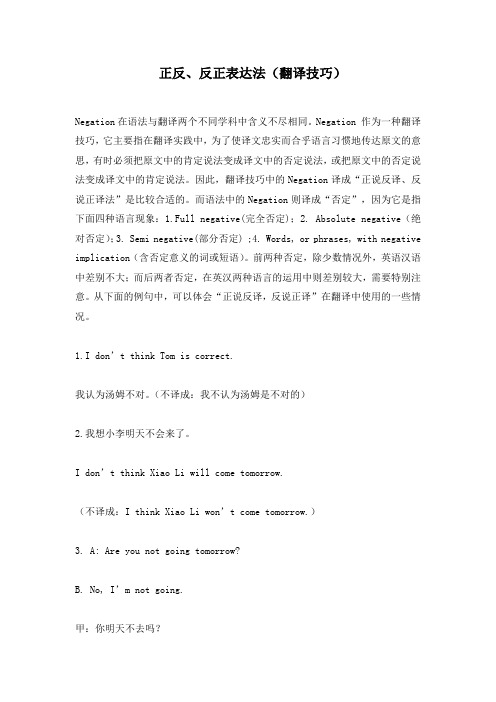
正反、反正表达法(翻译技巧)Negation在语法与翻译两个不同学科中含义不尽相同。
Negation 作为一种翻译技巧,它主要指在翻译实践中,为了使译文忠实而合乎语言习惯地传达原文的意思,有时必须把原文中的肯定说法变成译文中的否定说法,或把原文中的否定说法变成译文中的肯定说法。
因此,翻译技巧中的Negation译成“正说反译、反说正译法”是比较合适的。
而语法中的Negation则译成“否定”,因为它是指下面四种语言现象:1.Full negative(完全否定);2. Absolute negative(绝对否定);3. Semi negative(部分否定) ;4. Words, or phrases, with negative implication(含否定意义的词或短语)。
前两种否定,除少数情况外,英语汉语中差别不大;而后两者否定,在英汉两种语言的运用中则差别较大,需要特别注意。
从下面的例句中,可以体会“正说反译,反说正译”在翻译中使用的一些情况。
1.I don’t think Tom is correct.我认为汤姆不对。
(不译成:我不认为汤姆是不对的)2.我想小李明天不会来了。
I don’t think Xiao Li will come tomorrow.(不译成:I think Xiao Li won’t come tomorrow.)3. A: Are you not going tomorrow?B. No, I’m not going.甲:你明天不去吗?乙:是的,我不去。
4. ①Africa is not kicking out Western Imperialism ②in order to invite other new masters.①非洲踢出西方帝国主义②并不是为了请进其他新的主子。
(假如不运用“正说反译,反说正译”这一技巧,译文就会成为:“非洲不踢出西方帝国主义为了请进其它新的主子。
- 1、下载文档前请自行甄别文档内容的完整性,平台不提供额外的编辑、内容补充、找答案等附加服务。
- 2、"仅部分预览"的文档,不可在线预览部分如存在完整性等问题,可反馈申请退款(可完整预览的文档不适用该条件!)。
- 3、如文档侵犯您的权益,请联系客服反馈,我们会尽快为您处理(人工客服工作时间:9:00-18:30)。
• 瞧,有几个美女往这边来了,你看见了吗?
(cf. 你没看见吗?)
• Some questions in English look like disjunctive questions, but actually they are not. The statement and question have two different subjects covering different persons or things. In translation, the negation is generally not expressed.
question is rhetorical or general, except absurd questions such as “Haven’t you got eyes?”. A rhetorical question, which the speaker uses to gain an effect, does not expect any answer.
• 你不打算做这项工作吗?
• Yes, I am.
• 不,我打算做。
• No, I’m not.
• 是的,我不打算做。
(2). Translation of Negative Questions
• Look, some beauties are coming this way,
don’t you see them?
• My overcoat would not wear out.
• 我的大衣十分耐穿。
• If that isn’t what I want!
• 就它了! • Nothing is more mysterious than the smile of Monalisa. • 蒙娜丽莎的微笑是最神秘的啦。
incomplete
Negative Form
不完全的
Affirmative Form
残缺的
unasked
unprecedented dislike disbelief
未经邀请的
前所未有的 不喜欢 不相信
自告奋勇的
空前的 反感、讨厌 怀疑
undisguised
无伪装的
公然、公开的E.G.• Yesterday the President gave an unprepared speech
(3). 把句子的其他成分转移到动词
E.g. He gave me not even a moment to collect rubbish. 他打扰我收破烂。
2. Conversion of the Affirmative in to the Negative (肯定形式译成否定形式 )
什么是肯定形式的英语句子? --英语句子中既没有否定词,如no, not, never, none, neither, nobody, nothing, nowhere , nowise, 也没有带有否 定前缀或后缀的词,如dis-, im-, in-, ir-, non-, un-, -less.
• 有些动词,如assume, surmise 和presume,引导的从句中,在英 翻中时主句的否定不能转移到从句当中 E.g. I can’t assume that his elder aunt came. 我不能假定他大姨媽 来了。 I assume that his elder aunt couldn’t come. 我猜想他不能来。
1. Transfer of the Negative (否定转移)
(1). 把主句的否定转移到that从句
• think, believe, suppose, expect, imagine, fancy, reckon 引导的从 句,在英翻中时应使用否定转移 E.g. We don’t believe that our mother tongue is inferior to any other language in the world. 我们相信,祖国的语言并不亚于世界任何其他语言。 I don't think that you are a gay. 我不認為你搞基。
(2). Full negation (全部否定)
• Full negative + affirmative predicate:
E.g. Nobody succeeds. • Full negative + words with negative prefixes or suffixes, or words implying negation. E.g. He was always unkind. • Not… any… E.g. He cannot remember anything.
before a big audience.
• 昨天总统在大庭广众面前即兴致辞。
• Aren’t they fine, these three men are going off into nowhere like that? • 这三人真行,前途茫茫,就这样去了。
(2). Conversion of Negative Sentences into Affirmatives
(4). Translation of Rhetorical Questions • There is hardly a clear-cut line between a rhetorical
question and a general question. Context decides whether a
• Partial affirmative + not : Partial negative
E.g. Some students are not here.
≈ Some students are here.
有些学生不在。
• Not + full negative : Partial negative
agreement cannot be implemented in the next few weeks.
• 兹函请惠予注意协议条款是否可在今后几周内实施。
5. Translation of Various Kinds of Negation (英语各种否定译法 )
(1). Partial Negation 部分否定
• Literary style:岂不
• Modern or colloquial style:难道
• Is this the part of wise men, engaged in a great and arduous struggle for liberty? Are we disposed to be of the number of those, who having eyes, see not, and having ears, hear not, the things which so nearly concern their temporal salvation?
•
It’s not going to rain, is it?
• 不会下雨,是不是?
• No.
• 是的,不会。 • Yes. it’s going to rain. • 不,会下雨的。
Silent Answers • “You’re not going to school today?” Mother shouted down the stairs to her little one. The child looked up and shook his head. • “今天你就不上学啦?”母亲从楼上喊下来,问她的小宝 贝。孩子抬起头来点了一下。
confuse the reader.
•
I wonder if he cannot help me out of the difficulty.
• 我不知道他是否能帮我摆脱这个困境。
• I am writing to ask your help in seeing if the provisions of the
(2). 把谓语动词的否定转移到状语
E.g. Rome was not built in a day. 羅馬非朝夕建成 Love is not made by anyone. 愛無刻意。 Just because she doesn't shout you should not suppose that she is satisfied. 你不可只因为她不骂你,就以为她心满意足了。
• 为争取自由而从事伟大而艰巨的斗争的明智人士,难道应
该这样做吗?对于目前自救运动密切相关的事业视而不见、 充耳不闻的人,难道我们甘心情愿与之为伍吗?
(5). Translation of Indirect Negative Questions
• Negation can be found even in indirect questions, which in our mode of expression should be in a tone of uncertainty, such as “是否可以……”, “能不能……”. A literal translation will
中文的肯定句又是怎样的呢? --中文的肯定句,句子中不含有“不”,“非”,“否”, “没(有)”,“未”,“别”,“勿”,“莫”, “休”,“甭”。
E.g. •Take it or leave it. • 买不买随你。
• That time when he played as Holmes I doubled up with laughter. •他演福尔摩斯那一回,我笑得直不起腰来。
• “all the + noun + not” and “ not all the + noun ”: full negation E.g. All the money in the world won’t make you happy. 即使你拥有了世界上所有的财富,你也不会快乐。
